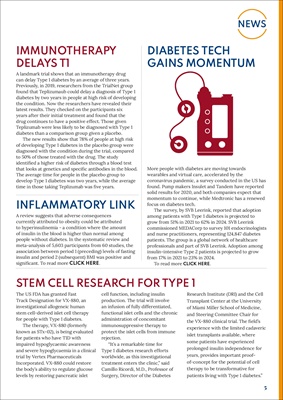
5
NEWS
IMMUNOTHERAPY
DELAYS T1
A landmark trial shows that an immunotherapy drug
can delay Type 1 diabetes by an average of three years.
Previously, in 2019, researchers from the TrialNet group
found that Teplizumaub could delay a diagnosis of Type 1
diabetes by two years in people at high risk of developing
the condition. Now the researchers have revealed their
latest results. They checked on the participants six
years after their initial treatment and found that the
drug continues to have a positive effect. Those given
Teplizumab were less likely to be diagnosed with Type 1
diabetes than a comparison group given a placebo.
The new results show that 78% of people at high risk
of developing Type 1 diabetes in the placebo group were
diagnosed with the condition during the trial, compared
to 50% of those treated with the drug. The study
identified a higher risk of diabetes through a blood test
that looks at genetics and specific antibodies in the blood.
The average time for people in the placebo group to
develop Type 1 diabetes was two years, while the average
time in those taking Teplizumab was five years.
DIABETES TECH
GAINS MOMENTUM
STEM CELL RESEARCH FOR TYPE 1
The US FDA has granted Fast
Track Designation for VX-880, an
investigational allogeneic human
stem cell-derived islet cell therapy
for people with Type 1 diabetes.
The therapy, VX-880 (formerly
known as STx-02), is being evaluated
for patients who have T1D with
impaired hypoglycaemic awareness
and severe hypoglycaemia in a clinical
trial by Vertex Pharmaceuticals
Incorporated. VX-880 could restore
the body's ability to regulate glucose
levels by restoring pancreatic islet
cell function, including insulin
production. The trial will involve
an infusion of fully differentiated,
functional islet cells and the chronic
administration of concomitant
immunosuppressive therapy to
protect the islet cells from immune
rejection.
"It's a remarkable time for
Type 1 diabetes research efforts
worldwide, as this investigational
treatment enters the clinic," said
Camillo Ricordi, M.D., Professor of
Surgery, Director of the Diabetes
Research Institute (DRI) and the Cell
Transplant Center at the University
of Miami Miller School of Medicine,
and Steering Committee Chair for
the VX-880 clinical trial. The field's
experience with the limited cadaveric
islet transplants available, where
some patients have experienced
prolonged insulin independence for
years, provides important proofof-concept
for the potential of cell
therapy to be transformative for
patients living with Type 1 diabetes."
More people with diabetes are moving towards
wearables and virtual care, accelerated by the
coronavirus pandemic, a survey conducted in the US has
found. Pump makers Insulet and Tandem have reported
solid results for 2020, and both companies expect that
momentum to continue, while Medtronic has a renewed
focus on diabetes tech.
The survey, by SVB Leerink, reported that adoption
among patients with Type 1 diabetes is projected to
grow from 51% in 2021 to 62% in 2024. SVB Leerink
commissioned MEDACorp to survey 101 endocrinologists
and nurse practitioners, representing 124,847 diabetes
patients. The group is a global network of healthcare
professionals and part of SVB Leerink. Adoption among
insulin-intensive Type 2 patients is projected to grow
from 17% in 2021 to 23% in 2024.
To read more CLICK HERE.
INFLAMMATORY LINK
A review suggests that adverse consequences
currently attributed to obesity could be attributed
to hyperinsulinemia - a condition where the amount
of insulin in the blood is higher than normal among
people without diabetes. In the systematic review and
meta-analysis of 5,603 participants from 60 studies, the
association between period 1 (preceding) levels of fasting
insulin and period 2 (subsequent) BMI was positive and
significant. To read more CLICK HERE.